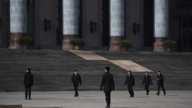【新唐人2014年01月01日訊】中共國家審計署12月30號宣佈,中國地方政府的債務,今年6月底已經攀升到17萬 9000億元人民幣。經濟分析人士擔心,在經濟增長速度放慢的情況下,地方的債務迅速增長,可能導致壞賬增加。而地方債務攀升會給中國經濟帶來甚麼影響,這些債務最後由誰買單?我們來聽聽專家的分析。
30號,大陸審計署在官網公布了長達13頁的審計數據。根據審計署的報告,截至2013年6月底,各級政府負有償還責任的債務20萬7000億,其中中央債務9萬8000億,地方債務10萬 9000億,如果包括有可能產生的債務,總體債務將有30萬 3000億,其中中央12萬4000億,地方17萬9000億。
美國南卡羅萊納大學艾肯商學院教授謝田:「地方政府的債務在過去十幾年中,慢慢的增長起來的,地方政府的債務上升的原因,是地方政府利用各種各樣的融資平臺,城建基金平臺,用這些錢來籌集資金,投資建設房地產項目,基建項目,來帶動GDP,現在看來已經失控了。」
地方債務增長在資金來源方面,主要源於債券與信託等方式,而銀行貸款仍是主要的融資方式。截至2013年6月,地方債務在銀行貸款的整體規模約有10萬億。而債券的發行也大幅增長,增長到了1萬8400億。其他融資方式如﹕BT(Build-Transfer,建設-移交)、信托等,增長了4萬5000億元。
謝田:「中央政府曾經派出很多工作組到各個省市去調查,但這個調查回來的數字,並沒有被立即披露,這實際上是一個政策性問題,說中央政府 有多少承擔的能力,願意把這真正的數據披露多少,現在外界認為,估計可能都超過了30萬億,甚至更多。」
10月20號,中共審計署曾向國務院匯報了地方債務最新規模。對於剛剛出爐的數字,社會各界,包括外國金融機構都頗為期待,但是卻遲遲沒有公布。
11月30號,中共喉舌《新華網》發表文章宣稱,地方債測算的兩個主要部門,財政部和審計署,一直以來因為統計口徑的不同,測算結果也存在差異,統計結果還沒有確定,難以公布。
英國廣播公司《BBC》中文網報導,北京在7月底開始債務審計,當地政府借款是關注的焦點。許多人擔心中國債務問題,以及它對中國經濟的潛在影響。
謝田分析,地方債攀升近18萬億,對目前中國經濟的影響非常嚴重。再加上2014年即將進入的還債高峰期,一旦出現大規模的違約,後果不堪設想。
謝田:「中國地方政府按正常匯率來算,其實都應該破產,可能會出現幾百個、上千個底特律,中國政府會不會做勢讓這些地方政府破產,還是不讓他們破產,不得不繼續投入資金,來挽救這些地方政府,如果投入資金,勢必中共會繼續加快印鈔步伐,造成全國範圍內更大通貨膨脹,救和不救﹖對中央政府來說,都是一 件很困難的事情。」
中國金融智庫研究員鞏勝利認為,目前中國還沒有處理政府債務的環境。
鞏勝利:「中國廣東省開平市江門地區,當年曾經發生過這麼一件事,有一個中國銀行的行長,攜帶大概3.8億美金,跑到美國去了,結果造成了這個市經濟危機,所有的老百姓存到銀行裏面的錢,只能存不能取,後來,中央下撥了一些經費,緩解了整個城市的金融危機。」
謝田:「中共權貴巧取豪奪的盛宴中,裝的盆滿缽滿,他們不會把他已經吞下去的財富吐出來,中國的這些地方債也是同樣,百姓還負擔。」
謝田預計,中共一定會以印發鈔票通過通貨膨脹的形式,讓全中國百姓來承擔。
採訪編輯/常春 後製/李勇
China Local Debts Reach 18 Trillion Yuan
On December 30, the Chinese Communist Party (CCP)
National Audit Office (NAO) announced local debts.
This figure was 17.9 trillion Yuan ($2.95 trillion).
Financial analysts are concerned at further increases
in bad debts under the current economic slowdown.
They are also concerned at rapid growth of local debt.
How will escalating local debts affect the
Chinese economy, and who will cover the costs?
Let’s hear what the experts have to say.
On December 30, China’s NAO
published a 13-page audit data report.
It revealed that, as of the end of June this year, the CCP
has accumulated debt obligations of 20.7 trillion Yuan.
Central debts were 9.8 trillion, with local debt
at 10.9 trillion. Total liability is 30.3 trillion yuan.
This means 12.4 trillion from the
central, with 17.9 trillion from the local.
Xie Tian, Professor of University of South Carolina Aiken:
“Local debt has been accumulating for more than 10 years.
This is due to local governments raising funds through
financing, to invest in real estate and projects to boost GDP.
It looks like they have now lost control."
Bonds and trusts are the main source for local funds, and
local governments mainly rely on bank loans for financing.
As of June 2013, there were overall local debts of
around 10 trillion, and 1.84 trillion of local bonds.
Other financing, such as Build-Transfer and
trusts, have accumulated to 4.5 trillion Yuan.
Xie Tian: “The audit has gone to each province and
city, and the data was not made available to the public.
There is an issue of policy about how
much the government can afford to reveal.
People have alleged that accumulated, local
debts are worth 30 trillion, or even more."
The NAO had reported the latest local
debts to the State Council on October 20.
Despite much anticipation, the figure
had been withheld from being published.
State-controlled Xinhua reported on November 30
that the delay had been caused by a discrepancy
between the Ministry of Finance and the NAO.
This was due to each employ different statistical standards.
BBC Chinese reported that China’s NAO started the task
in July, to round-up the debts outstanding at a local level.
There have been persistent fears over the level of non-
performing bad debt, and its potential impact on China.
Professor Xie Tian analyzes the
severity of the accumulated local debts.
He warns of the possible disastrous consequence, if there
is a massive breach during paying back the debts in 2014.
Xie Tian: “According to regular interest rates, the local
governments should have all experienced bankruptcy.
Will the CCP allow them to go bankrupt, or
will it continue to inject cash to save them?
If it injects cash, the regime must continue to print money.
Consequently, there will be a greater inflation in China.
Should they do it? This is a dilemma for the regime."
Financial researcher Gong Shengli does not believe
the regime has the capacity to deal with local debts.
Gong Shengli, financial researcher: “In Kaiping City,
Guangdong, it has been reported that a bank CEO
ran away to the United States with $380 million .
The entire city went into a crisis, where
people could only deposit, but not withdraw.
The Central regime had to allocate
funds to relieve the financial crisis."
Xie Tian: “None of those higher officials
will spill the wealth they have collected.
It will be the same for the local debts,
and ordinary Chinese people will pay it."
Xie Tian believes the regime will make the people to
pay the bill,via printing money, and through inflation.
Interview & Edit/ChangChun Post-Production/LiYong


























